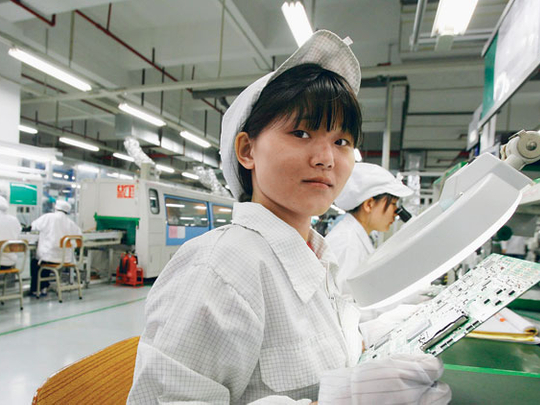
Longhua: Dressed in white, the traditional colour of mourning in China, the father of 19-year-old Ma Xiangqian weeps outside the gates of a sprawling electronics complex. His wife and daughter kneel alongside.
Ma is one of nine workers who have died in apparent suicides at tightly guarded factory complexes this year, raising questions about the harsher aspects of blue-collar life around southern China's Pearl River Delta — dubbed the workshop to the world.
The parents say Ma, who was found dead at the bottom of a stairway at the campus in January, died in mysterious circumstances. They want to know why.
"All we want to know is the truth. We don't even want compensation," said the father.
The Longhua factory belongs to Hon Hai Precision Industry, the Taiwan giant that is contracted to make computers, game consoles, handphones and other electronics gadgets for Apple and many major global brands.
Hon Hai Chairman Terry Gou, one of Taiwan's best known businessmen, yesterday led a rare media tour of the Chinese complex, part of an unprecedented publicity blitz to counter a growing backlash over the suspected suicides.
"I'm very concerned about this. I can't sleep every night," said Gou. "From a scientific point of view, I'm not confident we can stop every case. But, as a responsible employer, we have to take up the responsibility of preventing as many as we can."
The stakes are high for Hon Hai and its Foxconn unit that makes mobile phones for Nokia and other global names, amid growing calls from activists for a global boycott of products like Apple's latest generation iPhone.
"It's a crucial issue that Hon Hai has to deal with right away," said Andrew Deng, an analyst with Taiwan International Securities.
Hon Hai and Foxconn have come under fire for their harsh and secretive corporate culture.
Workers outside the Longhua complex reacted angrily to a letter they say they were abruptly asked to sign on Tuesday night, including a clause saying the company would pay no more than the legal minimum for injuries sustained outside the workplace.
Confronted with the letter, Gou apologised and said he was taking it back, calling the language inappropriate.












